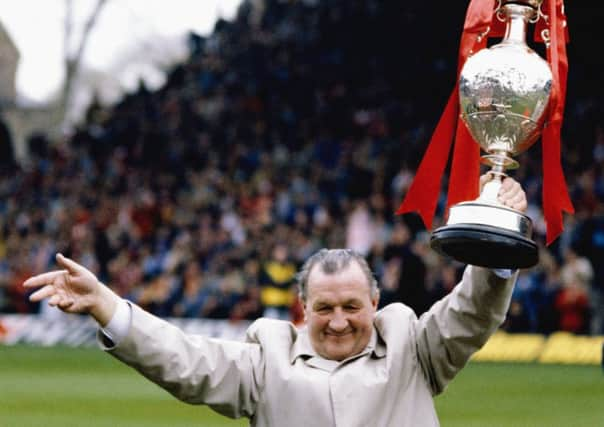Bob Paisley: Scots trio who helped make him Liverpool legend


This might be a question posed tomorrow night at the Brunton Theatre in Musselburgh, where John Keith’s Bob Paisley: Reluctant Genius is being staged.
The venue might seem slightly incongruous. Paisley grew up in Co. Durham before going on to make his name with Liverpool, first as an industrious left-half. After retiring he enrolled on a correspondence course and qualified as a physiotherapist, working for the club’s backroom staff.
Advertisement
Hide AdAdvertisement
Hide AdBut it’s what happened after he was pushed into the manager’s job following Bill Shankly’s sudden retirement that sets him apart: 19 trophies in nine years, including three European Cups.
This haul means he more than qualifies for tomorrow night’s special treatment, even so far from his spiritual home of Anfield. Shankly, pictured inset, was celebrated on the same stage earlier this year, when Ian St John, Chris Lawler and Ian Callaghan toasted his memory.
Callaghan returns tomorrow night for a semi-scripted evening along with three other greats from the Paisley era: Phil Neal, Alan Kennedy and Jimmy Case. They have Paisley to thank for a European Cup winner’s medal collection that adds up to ten.
Remarkably Neal alone owns four.
But two of Paisley’s three wins were built around a holy trinity of Scots. Keith, a veteran journalist and broadcaster who covered the Anfield glory years of the 1970s and 80s, describes the capture of Hansen, Dalglish and Souness as Paisley’s “crowning glory”.
They arrived at Anfield in that order and featured in Liverpool’s European Cup win over Bruges at Wembley in 1978. Souness, indeed, passed to Dalglish, who scored the game’s only goal with a delicious dinked effort.
What did Paisley do? He didn’t run down the touchline to join Dalglish as the striker leaped over the advertising hoarding skirting the pitch, that’s for sure.
He could not have been further from the spotlight-stealing, agenda-setting, sharp-suited manager of today. The cardigan-wearing Paisley, who died in 1996 aged 77, was the complete antidote to Jose Mourinho. The way in which he contrasted with Shankly was stark enough. Keith recalls: “He had no idea about handling the media and, while it was vastly different to now, it was still a daily duty the manager faced.
“The press were there every day of the week. This bemused Bob. About six weeks into the job he got four of us national newspaper men together and said: ‘you know what I am trying to say, so you finish my sentences for me!’ This was a great responsibility for us, one that lasted the nine years he was in charge.
Advertisement
Hide AdAdvertisement
Hide Ad“Bob never did finish sentences. You had to guess what he meant. He said: ‘you know what I am trying to say, will you put it into cogent language for the following day’. And that is what we did.
“Today Shankly would be in his element with the wall-to-wall media,” adds Keith. Paisley, upon learning ITV was coming to screen a match, once put on his BBC tie to avoid being interviewed before the game.
He was happier shooting the breeze with fellow coaches in the famous Anfield bootroom he created with Joe Fagan, who replaced him in a line of succession that became the model for so many other clubs – and also the envy of them.
The difficulties Manchester United are in currently prove how hard it is to replace someone – Sir Alex Ferguson in their case – who exerted such a hold on all aspects of a successful football club.
But Paisley slipped into Shankly’s shoes like they were a pair of his comfortable slippers. “Bill put steel tips on his shoes so people could hear him coming, I prefer carpet slippers,” he once said.
Paisley expressed himself via the way he wanted Liverpool to play football. And few were more central to this ethos than Hansen, Dalglish and Souness.
“I’d like someone to tell me three better players signed by a manager,” says Keith. “Maybe [Matt] Busby with Best, Law and Charlton.
“But Hansen, Dalglish and Souness were key to Bob’s success. Bob drooled over Kenny. He used to call him the ‘Dalglish fella’.”
Advertisement
Hide AdAdvertisement
Hide AdHansen was spirited away from Partick Thistle in 1977, the first of the trio to arrive at Anfield. After Liverpool were knocked out of the European Cup by Red Star Belgrade in 1973 – Shankly ‘s last European match in charge – Paisley was sharp enough to recognise how the game was changing.
“Bob set in motion this idea that football needs to be played from the back,” says Keith. The tall, elegant, ball-playing Hansen was tailor-made for the job.
Souness, meanwhile, ran things for a Liverpool team that remain, perhaps, the finest club side the British game has seen. The taciturn Paisley was still able to find the perfect way to depict his skipper’s class. “He doesn’t toss up with a coin,” he said. “He does it with a credit card”. Souness later returned the “compliment”, describing Paisley as the best reader of the game he has known.
Whether he is the best British manager of all time, Keith is not so sure. Ferguson’s deeds with Aberdeen on top of what he achieved at Manchester United might nudge him in front.
But it’s right Paisley is still being celebrated, in Musselburgh and elsewhere, 20 years after his death.
l Bob Paisley: Reluctant Genius. Brunton Theatre, Musselburgh. Thursday October 27. £24 with £20 concession from theatre box office or by calling 0131 665 2240. Also www.hubtickets.co.uk